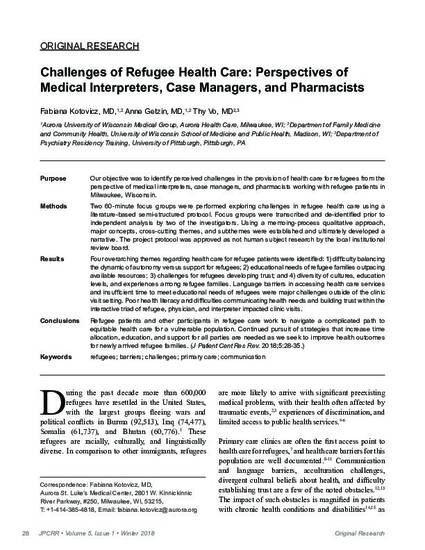
- refugees,
- barriers,
- challenges,
- primary care,
- communication,
- pharmacy,
- interpreter,
- social work
Purpose: Our objective was to identify perceived challenges in the provision of health care for refugees from the perspective of medical interpreters, case managers, and pharmacists working with refugee patients in Milwaukee, Wisconsin.
Methods: Two 60-minute focus groups were performed exploring challenges in refugee health care using a literature-based semi-structured protocol. Focus groups were transcribed and de-identified prior to independent analysis by two of the investigators. Using a memoing-process qualitative approach, major concepts, cross-cutting themes, and subthemes were established and ultimately developed a narrative. The project protocol was approved as not human subject research by the local institutional review board.
Results: Four overarching themes regarding health care for refugee patients were identified: 1) difficulty balancing the dynamic of autonomy versus support for refugees; 2) educational needs of refugee families outpacing available resources; 3) challenges for refugees developing trust; and 4) diversity of cultures, education levels, and experiences among refugee families. Language barriers in accessing health care services and insufficient time to meet educational needs of refugees were major challenges outside of the clinic visit setting. Poor health literacy and difficulties communicating health needs and building trust within the interactive triad of refugee, physician, and interpreter impacted clinic visits.
Conclusions: Refugee patients and other participants in refugee care work to navigate a complicated path to equitable health care for a vulnerable population. Continued pursuit of strategies that increase time allocation, education, and support for all parties are needed as we seek to improve health outcomes for newly arrived refugee families.
Kotovicz F, Getzin A, Vo T. Challenges of refugee health care: perspectives of medical interpreters, case managers, and pharmacists. J Patient Cent Res Rev. 2018;5:28-35. doi: 10.17294/2330-0698.1577
